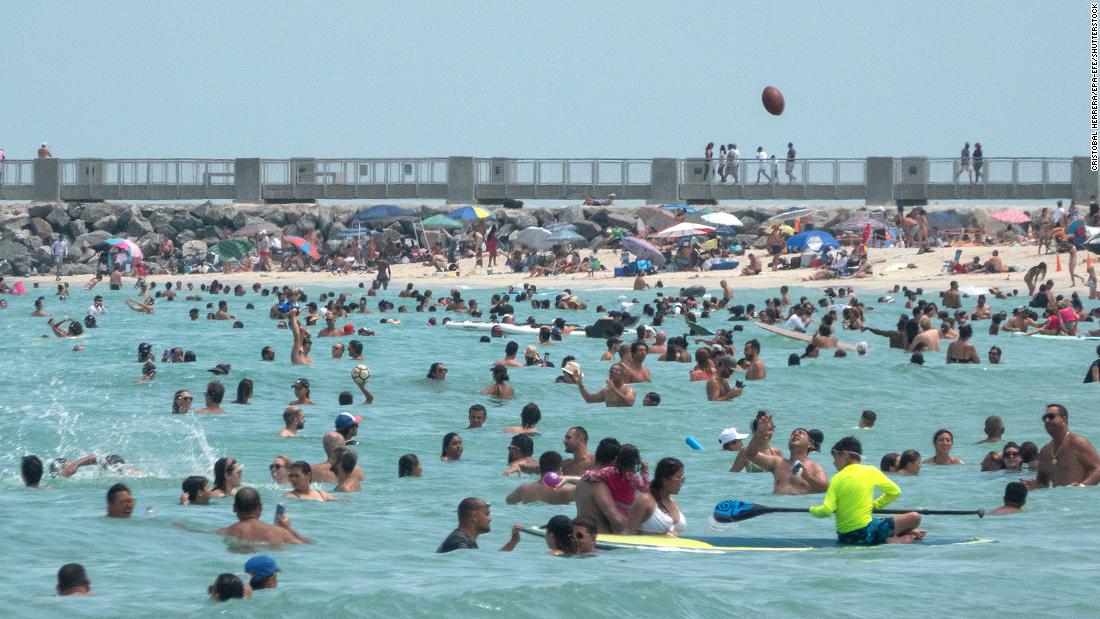[ad_1]
One of the resources will look at “how to really take advantage of face coverings,” Redfield said. “Because to me, face coverings are the key. If you really look at it, the data is really clear, they work.”
Some students, he said, will need home schooling because of medical issues, but the goal is to have face-to-face interaction five days a week.
The CDC is especially concerned about the well-being of high school students, Redfield said.
“We’re seeing, sadly, far greater suicides now than we are deaths from Covid,” he said. “We’re seeing far greater deaths from drug overdose, that are above excess, than we had as background, than we are seeing deaths from Covid.”
Most US parents say it would be risky to send their children back to school in the fall, according to this week’s installment of the Axios-Ipsos Coronavirus Index.
The poll showed 82% of Democrats and 53% of Republicans say returning to school would be very or moderately risky. Eighty-nine percent of Black parents saw returning to school as a large or moderate risk, compared with 80% of Hispanic parents and 64% of White parents.
In New York City, Mayor Bill de Blasio offered options for partial in-person instruction. But Gov. Andrew Cuomo said Monday in order for in-person class to be allowed, a region must be in Phase 4 of reopening, which New York City is not.
In Los Angeles, students will learn at home this fall, the school district said.
More than 3.3 million people have now tested positive for coronavirus — but the true number of infections could be much higher, experts have said, as at least 40% of those who contract the virus show no symptoms, according to a new estimate by the CDC.
Covid may approach magnitude of 1918 pandemic, Fauci says
Dr. Anthony Fauci, the director of the National Institute for Allergy and Infectious Diseases, said that Covid-19 is a “pandemic of historic proportions.”
“I think we can’t deny that fact,” Fauci said during a Georgetown University Global Health Initiative webinar. “If you look at the magnitude of the 1918 pandemic where anywhere from 50 to 75 to 100 million people globally died, that was the mother of all pandemics and truly historic. I hope we don’t even approach that with this, but it does have the makings of, the possibility of … approaching that in seriousness.”
Fauci added that he hopes the medicinal interventions that are in trials will one day help prevent such a disaster.
Redfield said in a webinar with the Journal of the American Medical Association that without a biological countermeasure, such as a vaccine, “we’re going to have to go through two or three years of wrestling with this virus.”
He had more immediate worry.
“I do think the fall and the winter of 2020 and 2021 are going to be the probably one of the most difficult times that we experienced in American public health,” he said.
It will be really important to keep the health system from being overstretched, Redfield said.
Epicenter in the Sunshine State
Florida is struggling. On Tuesday, state health officials reported 132 Covid-19 related deaths from Monday, breaking the state’s record for most deaths in a single day due to coronavirus. The previous record was 120 deaths reported July 9.
“What we were seeing in Wuhan — six months ago, five months ago — now we are there,” Lilian Abbo, with the Jackson Health System said during a news conference hosted Monday by the Miami-Dade County mayor.
The Chinese city of Wuhan, the original epicenter of the coronavirus crisis, went into a 76-day lockdown in late January after a deadly outbreak infected and killed thousands.
In the past 13 days, Miami-Dade County has seen staggering increases in the number of Covid-19 patients being hospitalized (68%), in the number of ICU beds being used (69%) and in the use of ventilators (109%), the Miami-Dade County Government reported.
Forty-eight Florida hospitals, including eight in Miami-Dade, have reached their ICU capacity, according to the Agency for Health Care Administration.
“We need your help as media communicators to help the community understand that we’re just not repeating the same thing over and over just to give you trouble, we really need your help,” Abbo said, directing those comments to reporters.
The plea echoes the requests from other leaders in the state and across the country who have seen new cases spike as people flocked back outside following weeks of lockdowns. When states began lifting restrictions, images quickly emerged of pool parties, packed beaches, reopened bars and holiday celebrations with no social distancing or face masks. Health officials warned then of what they’re now reporting: clusters of infections that are often traced back to people who didn’t heed reopening guidelines.
With no way to control the rapid spread of the virus and with thousands possibly infecting others unknowingly, state and local officials have been forced to ponder more restrictions and, in some cases, consider a second round of lockdowns.
CNN’s Amanda Watts, Maggie Fox, Ralph Ellis, Artemis Moshtaghian, Stephanie Elam, Raja Razek, Sarah Moon, Shelby Lin Erdman, Konstantin Toropin, Rosa Flores, Dan Shepherd and Matthew Hilk contributed to this report.
[ad_2]
Source link



